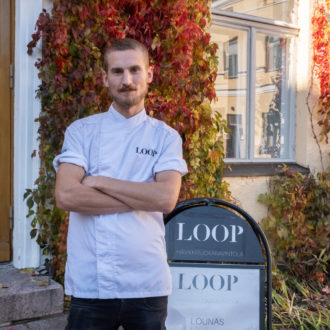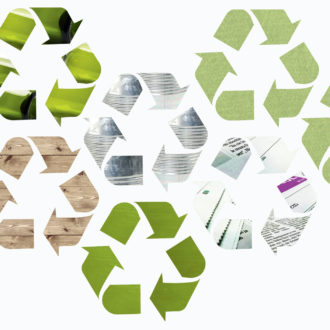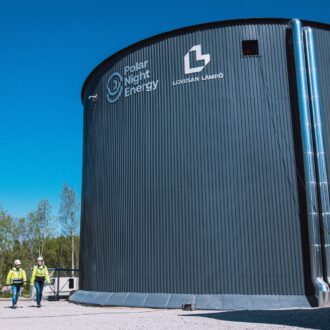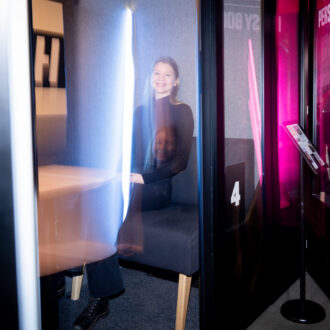Have you ever attended an event with great speakers, workshops or musicians, but felt dismayed at the mountain of plastic waste overflowing the trash cans at the end of the day?
Several of Finland’s largest annual events make a point of devoting their energy to ensuring that they don’t burden the environment. We talk with the organisers of Slush, Flow Festival and Nordic Business Forum.
Compensating for carbon

Flow Festival visitors Ronja (left) and Aino say they don’t prioritise vegetarian food, but were just looking for a little snack – which turned out to be sweet potato fries from Soisoi.Photo: Tim Bird
“Flow Festival is a carbon-neutral festival,” says Suvi Kallio, the managing director of the urban music festival that takes place every August in Helsinki (90,000 attendees in 2022). The festival considers sustainability in energy production, catering and transportation. It reuses and recycles materials, and encourages festival-goers to do the same.
“It’s obvious that this kind of an event causes emissions, especially the flights of the international artists,” says Kallio. “We compensate for the emissions by donating to renewable energy initiatives.”
Nordic Business Forum (NBForum, more than 7,000 attendees in 2022), staged at the Helsinki Fair Centre in the Pasila district, has hosted speakers including Richard Branson and Barack Obama. The organisers believe that the most effective way to influence society as a whole is to inspire and equip business leaders who want to make the world a better place.
Setting a good example
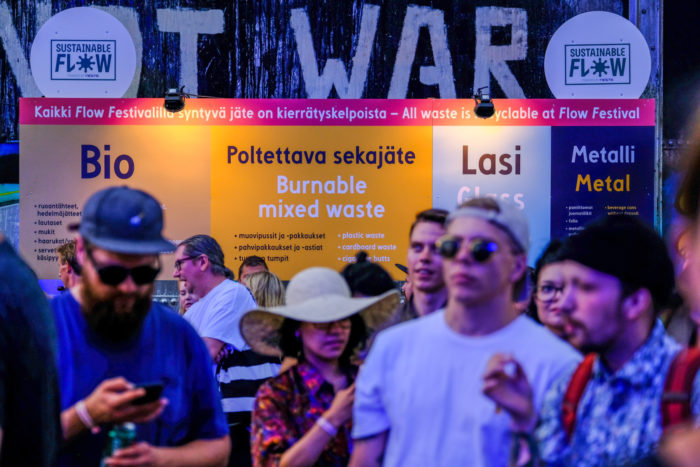
Empirical evidence shows that if you offer people a convenient option for sorting their garbage, they’re happy to have the opportunity; Flow Festival puts up stations with bins for metal and glass recycling; biodegradable waste; and mixed garbage bound for incineration.Photo: Tim Bird
“It is important that we make business leaders understand the importance of leading with sustainable values,” says NBForum CEO Aslak de Silva.
The event, held every autumn, uses catering and waste disposal practices that reflect a desire to set an example. Print materials and stage setups are designed to be reused from one year to another. In 2018 NBForum committed to planting 7,500 trees – one for each attendee – to offset greenhouse gas emissions.
“We take sustainability into account in all decisions related to event production, programming and operations,” says Anna Pakkala, head of sustainability at annual startup conference Slush, the largest event of its kind in northern Europe (20,000 attendees including 2,600 startups and 1,600 investors).
In 2018, for example, Slush offset 10,000 tonnes of CO2 with the help of a Finnish energy company that has set up a solar-power project in India. This covered the whole event and related emissions such as the flights of the participants.
Like NBForum, Slush has grown from humble local beginnings to international status, and is also staged at the Helsinki Fair Centre. Slush gets its name from the prevalent weather in late November and early December, when it takes place (November 17–18 in 2022).
Slush and Flow report to EcoCompass [a Finnish environmental management certification for small and medium-size enterprises] to track sustainability. “I also work with our teams to further integrate sustainability into the marketing, programming and offerings of our organisation on a year-round basis,” says Pakkala.
Food is more than fuel

“It really bugs me when there’s plastic everywhere, so I’m glad all the plates and cutlery here are biodegradable,” says Riku while munching on a stir-fry at Flow Festival using wooden chopsticks.Photo: Tim Bird
These events also rely on education and on making sustainable choices more attractive to their audiences.
“If we have the possibility to influence people, we want to use that in any way we can,” says Suvi Kallio. All Flow food venders offer vegan and sustainable meal options and participate in the Sustainable Meal initiative, a set of guidelines that direct attention to the ethicality and origin of the ingredients; energy efficiency in food production; logistics; and packaging material. The festival favours organic and locally produced food.
Catering entrepreneur Minna Väisälä has worked at Flow Festival for seven years. Her food stand, The Tasty Dogs, serves pork, lamb and seitan hotdogs, and French fries.
“We’ve developed our menu over the years together with the festival,” Väisälä says. Her festival sales are divided fairly evenly between the three varieties of hotdogs. In 2018, 46 percent of Flow visitors’ meal purchases were vegetarian or vegan.
Sustainability stems from the organisers
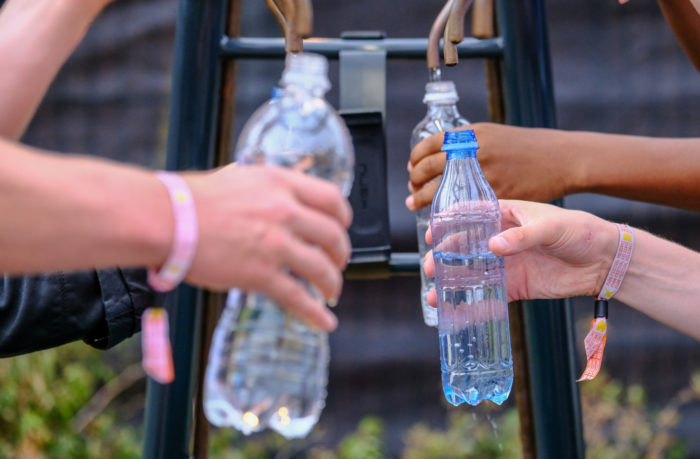
Simple but effective: Each Flow Festival visitor may bring one empty bottle and refill it at the water stations, a practice that beats the Finnish summer heat and significantly cuts the amount of plastic waste the festival-goers generate.Photo: Tim Bird
“Responsibility and friendliness to the environment have always been important values of the festival,” says Kallio, “but as the festival expanded we felt it would be good to start promoting and tracking environmental liability more systematically. Our audience is very aware, so our actions must be transparent.”
Of course, there’s still room for improvement. For Flow this means, most of all, increasing the recycling of compostable waste and reducing the amount of mixed waste, which a power plant incinerates to produce energy.
Sustainability is one of Slush’s core values, as well. “For several years it has been our key goal to set an example when it comes to sustainable event production,” says Pakkala, “even when it means that something might be a bit more difficult or costly to implement. We’ve also noticed that this is very much appreciated by people attending the event.”
By Anna Ruohonen and Tim Bird, November 2018, updated November 2022
